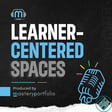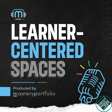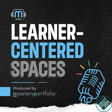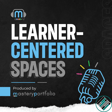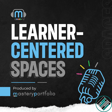Become a Creator today!Start creating today - Share your story with the world!
Start for free
00:00:00
00:00:01

Lindsay Lyons believes the secret sauce is student voice
Linked In - www.linkedin.com/in/lindsaybethlyons
Youtube - www.youtube.com/@lindsaybethlyons
Website: www.lindsaybethlyons.com
Free Resource: https://extras.lindsaybethlyons.com/learnercentered
If you’d like to be a guest on the show, or know someone who would be an inspiring guest, please fill out the survey found in the show notes.
Transcript
Introduction to Learner Centered Spaces Podcast
00:00:01
Speaker
Welcome to the Learner Centered Spaces Podcast, where we empower and inspire ownership of learning, sponsored by Mastery Portfolio, hosted by Star Saxton and Crystal Frommer. In each episode, we will bring you engaging conversations with a wide variety of educators, both in and out of the classroom.
00:00:22
Speaker
This podcast is created for educators who want to learn more about how to make the shift toward learner-centered spaces for their students, schools, and districts, or education at large.
Joining the Teach Better Podcast Network
00:00:33
Speaker
The learner-centered spaces podcast is now a member of the Teach Better Podcast Network.
Guest Introduction - Lindsay Lyons
00:00:43
Speaker
Lindsay Lyons is an educational justice coach who helps schools and districts co-create feminist anti-racist curricula that challenges, affirms, and inspires all students. A former New York City public school teacher, she holds a PhD in leadership and change and is the founder of the blog and podcast Time for Teachership. She believes the secret sauce of educational equity is student voice.
00:01:09
Speaker
So we're so excited to have you on with us, Lindsey. Can you tell us a little bit about yourself? What's your role, your location, some information about your journey, and maybe an interesting fact?
00:01:20
Speaker
Absolutely.
Lindsay's Journey and Educational Philosophy
00:01:21
Speaker
So I'm Lindsay. I call myself an educational justice coach, which is totally a term I made up, but I definitely help people from leaders to teachers think about the intersecting ways that we achieve justice in educational spaces. I am located in Framingham, Massachusetts, which is just to do a quick land acknowledgement, the land of the Nipmuc, the Pawtucket, and the Massachusetts people.
00:01:40
Speaker
I'm just outside of what's currently known as Boston, Massachusetts. I started not in education. I actually ended up doing an alternative certification program. I started with gender and women's studies and sociology and learning about the injustices in the world that I wanted to address. I actually realized
00:01:57
Speaker
late, basically the month before I graduated that I wanted to try to preemptively address them like with young children versus try to support people who had experienced injustices after they had already happened. And so that's a little bit of my journey into education I worked for.
00:02:14
Speaker
seven years in New York City public schools working with multilingual learners and students with IEPs. I got my PhD in leadership and change and have been basically running my own business and doing instructional coaching ever since. I would say an interesting fact about me is that I love dunking chips, ahoy cookies and orange juice, which grosses people out. I don't know. My mom does it with me and it's so delicious.
00:02:35
Speaker
That's hysterical. I've never tried it, so I'm not going to go ill because if you've never tried something, I guess it's a little premature to say ill. Does it matter what kind of orange juice? Does it need to be naturally squeezed?
00:02:51
Speaker
No, that's a good question. It matters the cookie type. So it's very specific to Shih Tzahweh, but not the orange juice. OK. All right. Sorry. Also, I mean, we have in common, I spent most of my teaching career in New York City public schools. So we have that in common too. Amazing. So as we kind of think about what we talk about on our podcast, can you tell us a little bit about what a learner-centered space looks like, feels like, and sounds like to you?
00:03:18
Speaker
Absolutely, and I have to say I love this question because it is really about the experience. So the looks feel sounds I think is really hitting it on the head. And I actually pull everything that I'm about to say from a looks like feels like sounds like kind of checklist for a curriculum audit because a lot of what I do is helping people co construct with students justice centered curricula.
00:03:38
Speaker
So one thing I would say is that there has to be some radical collegiality or like partnership with students. Radical collegiality comes from the student voice field. So basically just seeing students as colleagues and partners.
Defining Learner-Centered Spaces
00:03:52
Speaker
And what that looks like, I think, is that there's literally time built into each lesson where students are giving feedback to the teacher, like on the lessons on the unit at the end of the unit. It also looks and sounds like co-creating class agreements.
00:04:04
Speaker
I also love the Pedagogy of Student Voice, which I think is going to be its own book soon, but Jemila Dugan and Shane Safir talk about it in street data, and they say a pedagogy of student voice, they say a lot of things, but in part that it should be students speaking 75% of class time, which I think is a really big number, but would be amazing.
00:04:22
Speaker
then that projects can span various formats and what I call specializations. So students, yeah, we're all learning the same content, whatever those standards are, but students can specialize in whatever kind of subcategory or sub content that they have. So when I get the sense of what it feels like or what it looks like, students are in that zone of flow that we as adults also love being in where they're just kind of rolling with it, learning, loving life, kind of lose that sense of time. It's those moments where you get to the end of the period and you're like, wait, the period is over.
00:04:51
Speaker
I'm in the middle of this really fun thing. I also think it should be affirming. So there's joyful expressions of identity. All students have a sense of belonging. So any sort of histories we're talking about or stories or texts are really affirming to a variety of student identities. And that dignity, human dignity, is never up for debate in a classroom where there's a sense of belonging for everyone.
00:05:13
Speaker
And ideally, I think historically marginalized identity should make up more than 50% of text and author. So if I'm looking at a curriculum, that's what it would look like. Feeling wise, I think both for students and teachers are strong overlap. But I think teachers, feeling wise, should have trust in students, curiosity of what's going on with our students, hope that students can
00:05:32
Speaker
achieve all the things we want for them, a sense of like, I can do this, success, efficacy, joy, peace. I think a sense of peace for both students and teachers would be amazing, and the sense of effectiveness. And I think the only thing I would add for students in addition to all those things is kind of like, maybe like joy, love, connection, and pride.
Student-Led Projects and Alternative Grading
00:05:50
Speaker
Can I ask you, what does assessment look like in that type of classroom that you're describing?
00:05:56
Speaker
Yes, so I, most of what I do is help teachers figure out how to create curriculum centered around or developed backwards kind of plan from student led action projects. So sometimes I call these activist projects.
00:06:12
Speaker
It can look like whatever, but I think really advancing justice in your immediate community is the ultimate goal. And so it's basically applying whatever you're learning for an authentic purpose, an authentic audience. It goes beyond the teacher, beyond the grade, and there's real co-creation there. So again, students can specialize or
00:06:29
Speaker
kind of pick a subtopic in a content area. They also can co-create the process of how they get there and what that final product looks like. I also love, there's a Xander and Xander, I think it's a book, but there's a chapter in that book that talks about grading and they're just like, give the A. And so every student at the beginning of this one individual's class gets an A, I think it's like a music class or something, and they write themselves a letter of like, what would it look like if at the end of the course you have earned that A? Like what would that look like to you as an individual?
00:06:57
Speaker
And I've always loved that and thinking like if I could, I would give every student an A and they would describe to me like why they earned that and they would live that out. So any sort of grading based on your own kind of personal growth for each individual student versus like a letter or a ranking system I think is the way to go.
00:07:16
Speaker
I'm just, can I just ask a follow-up question, Lindsay? I'm so invested in what you're saying. And when I was in the classroom, it's basically how I taught, even in my AP class, I taught AP English. And even in that class, I really believed in co-construction of assessment choice over what and how they showed their learning. And then we did assessment conferences to co-construct grades for report cards. So what I'm wondering,
00:07:46
Speaker
from what you just described is what does it actually look like to have kids in your paradigm choosing those kinds of choices?
Co-Constructing Learning with Students
00:07:57
Speaker
I mean, I learned very quickly that kids aren't used to having choice in this way. So how do you teach them to make good choices that are going to help them both learn the skills they need to learn and also practice and demonstrate the content that needs to be demonstrated as well?
00:08:17
Speaker
Wow, this is such a good question. I hope I hit on all of the pieces that you asked because I think there's so much goodness in there. So I think one, going in, the co-construction I think to me is going in with a plan that is loose enough that there's flexibility. So I think that's an art and it takes people and including myself just from experience. It took me so long. I think I'm still really refining it.
00:08:39
Speaker
So I can tell you the range of things that that looked like when I was teaching, and then kind of what I what I think about now as I'm coaching teachers. So for me, it ranged all the way from we're going to do, for example, with seniors in a government class, we're going to do an action based project, and you're going to choose, you know, an issue. And then here's maybe three outcomes that could look like you could write to a letter to a government official advocating for some sort of legislation, you could
00:09:07
Speaker
create kind of an educational experience and teach your classmates or a different class in the school about this particular issue or like a choose your own adventure, you know, you tell me and we'll kind of work on it together. And so that was kind of the first iteration of what this looked like. I think I did that the first year I taught. All the way to the seventh year I taught, I was like experimenting and thinking how, just how nuts can we get here? And so I did a make your own unit unit with 90 students.
00:09:33
Speaker
And they literally designed the standards were all the same. But other than that, they could design anything. And so they designed the topic. They could decide if they were working individually or with a group. They got to pick from a list of people we had kind of crowdsourced as a staff who might be interested or willing to mentor the students in that particular topic area. Because of course, I couldn't be an expert in everything. And then they were able to have this place at the end where we called it a social justice expo.
00:10:03
Speaker
And we invited anyone in our school community who wanted to attend to kind of see their, almost like a science fair, the Tri-Fold posters. And they made like little iMovie trailers about it, but basically got to interview students about their projects and that kind of thing. So it was, I think it can be anything in between those things.
00:10:22
Speaker
And so one of the things I like to do as I'm coaching teachers is to think about what is the publishing opportunity. And so maybe that's shared across everything like the social justice expo. So everyone's project is going to be demonstrated in this way to this audience of school community or whatever. And
00:10:37
Speaker
maybe coming up with a list of project format ideas, because in the Make Your Own Unit, one of the things I learned is that students who are not used to this, which by high school, they are totally not used to choosing their own thing. They literally told me, I quote, Miss, your job is to tell me what to do. And my job is to do it. So they were not used to the co-creation idea. So I had to really come up with a list of things that it could look like and have a lot of conversations and make space for that really in the curriculum to have those conversations one on one.
00:11:05
Speaker
with students to really get to the bottom of what they wanted. You mentioned that students, especially when they get into the upper grades, are like, whoa, I'm not used to this. I'm not sure what to do with this freedom and do with this choice.
Advice for Traditional Settings
00:11:18
Speaker
But what about for teachers? What about an educator who really wants to lean into learner-centered spaces? What advice would you have for that teacher who maybe works in a more traditional environment and wants to give students voice and choice, but is not really sure how to
00:11:33
Speaker
start that, kind of blaze that path, so to speak.
00:11:37
Speaker
Yeah, so I have a lot of ideas. I'm going to try to segment these. So I think, one, if you were in a really traditional space or you're just getting started, I think the first step is developing that culture of a pedagogy of voice. So one of the first things I would do, particularly because we're in the fall, we're thinking about the new year, but I think this can happen, honestly, at any point, is co-creating class agreements. And so at any point, even if you didn't do this September, August, whenever you started,
00:12:04
Speaker
If you're like, I want to try this, take a recent discussion that maybe didn't go so well. Actually, if it doesn't go so well, even better for this conversation and say, hey, how would we like to have done this differently? Let's co-create what our class community looks like and actually use the words that students come up with.
00:12:19
Speaker
I have a lot of resources on how to do this I don't want to get into the weeds I can I can link those if you'd like I can share this with you. But I think another one is to pick a protocol and I really think you just need one, I loved circle. So coming from indigenous communities and really amplified by a lot of organizations out there that do this work.
00:12:37
Speaker
I love the idea of circle and facilitating circle in school spaces because it really democratizes the space. I mean, the teacher sits down with the students. The teacher doesn't get to speak unless they have the talking piece, just like all the students. Every student has an opportunity to share their voice, but can also pass. I mean, I just I love the sense of that. Like we are making space because your voice is so important for every student's voice. I think I think that would be really cool to try to do that and invite storytelling. So one way that's a really good intro activity
00:13:07
Speaker
either to introduce circles, start of the year, anything.
00:13:11
Speaker
is to say, what's the story of your name? And almost everyone has something they want to say about their name. Even if it's like, I hate my name, end of story, past the talking piece, they have an opportunity to share. Or they might say something, I mean, I had a senior one year who, after two years of having him, was like, miss everyone in the school, pronounces my name wrong, and I never wanted to correct them. And correcting me on the last day of school, I mean, if we had a circle about that student's name, they could have had that opportunity to share that two years earlier. So I think pick a protocol, could be anything,
00:13:39
Speaker
I like Circle, but something that you can do regularly, whether it's once a week, once a month, however often, and invite student voice and storytelling in that space. And then I think curriculum-wise is the next level. So if you're ready to do a little bit more intense version of this, it's an inviting,
00:13:56
Speaker
that co-creation of the curriculum. So designing a unit where the product could be a range of things that maybe you haven't tried before, or the content could provide room for students to specialize in the sub-content areas or sub-topics, or the process. And then you could start to blend them. So first unit I experiment with, co-creating the process. Next unit I experience, I do the co-creation of the product. And then often the hardest for teachers usually is co-creating the content. So that might be how I would scaffold that up.
00:14:25
Speaker
It's important, I think, what you said about, you know, start with one thing. Because there are some teachers who, I mean, there's so much thrown at us, right? Especially the beginning of the year of like, try this, try this, try this. And if you say, just start with one thing. And then that just makes it so much more attainable for busy teachers.
00:14:41
Speaker
okay, I can do this one thing. And then that will, you know, hopefully lead to another and, and, and so forth. So thank you for mentioning that.
Influences and Inspirations
00:14:48
Speaker
It's funny that you mentioned, you know, student voice, because this morning, this very morning, I was in the hallway with I teach seventh grade math. And I was in the hall, I share my classrooms in the hallway with the seventh grade lockers. And we had a unit that was or a lesson a couple days ago, it's been pretty tough for them.
00:15:07
Speaker
And so I kind of walked around and did an informal survey with them and said, do you guys want to move on to the next chapter? Or do you kind of feel like you want another day with this? I just wanted to get a vibe from them. And the kid actually responded, well, I don't know. You're the teacher. And I said, well, you're the learner.
00:15:25
Speaker
And he kind of paused. And so even that young, they're not used to giving their voice or having a teacher, I guess, ask, what do you guys think about where we go next? Something as traditional as the next lesson for a math class. So thank you for mentioning that. I love that story. And it makes me think, if I can just jump in quick, I'm sorry. Matthew Kay has a new book with Jennifer Orr. And he talks about the very end. So his whole book, Not Light But Fire, was all about high school discussions about race.
00:15:55
Speaker
Jennifer came on to talk about how to do this at an elementary level. And at the very end, Matthew Kay comes on and he says, you know, I stand on and all high school teachers stand on the shoulders of our elementary and effectively our middle school folks as well. We could not do the things that we can do.
00:16:14
Speaker
unless it was for setting that foundation early on in students' educational careers. So thank you, middle school teachers and elementary school teachers, because you make the work possible and far easier for high school teachers if you're setting that foundation early. Yeah, that's an awesome shout out. And it's so important. As somebody who taught mostly high school, I think I did one year in middle school. I have a tremendous amount of respect for folks who love the middle school space.
00:16:44
Speaker
and who have the patience and the quirkiness to make it fully what it can be. I think you really have to be able to not take yourself too seriously to be a middle school teacher. That was one of the things that I learned in that space. So the last kind of part of our podcast is we think about ways that we could shout out folks who
00:17:09
Speaker
are deserving of recognition or people you feel really promote this kind of pedagogy. So who are the people you would like to shout out that folks may or may not have heard of before?
00:17:23
Speaker
I love this question and I've been playing with kind of this, when I do professional development or something, a slide that's, you know, intellectual ancestors and contemporaries, basically just acknowledging that we as individuals are not people who just kind of come to all of the knowledge and experiences and wisdom that we then share with people, right? It's like a combination of all these experiences and learners.
00:17:45
Speaker
that we've learned from. So I really love Dr. Goldie Muhammad's work, Cultivating Genius, and her recent book on joy, I think is a wonderful pairing. She really defines culturally responsive and historically responsive education in this profoundly amazing, justice centered way. So I use that in most of my
00:18:06
Speaker
curriculum design things and all of that. I also would say the indigenous communities who began circle practice and then organizations like Morningside Center is where I was trained in New York City is incredible for thinking about the protocol itself that invites student voice. I would also say the student voice scholars like Dana Mitra, Mark Braceoff, who are really doing this work kind of in the academia world, but also working with coaching and learning from
00:18:35
Speaker
the K-12 teachers who do student voice work. Jamila Dugan and Shane Saffir, I mentioned, but their book Street Data is absolutely incredible. I've also worked with a ton of amazing folks who have really helped me
00:18:47
Speaker
Think about what it means to be in a classroom. Think about that question that you asked earlier about the feeling or the looks like or the sounds like. International Network for Public Schools and New York Performance Standards Consortium are two organizations that I routinely draw from even in my coaching now that I'm no longer living in New York. I still find myself looking through their resources and sharing them with educators who work with similar populations, but maybe not in New York City. I mean, I've learned through many
00:19:13
Speaker
classroom teachers that I've shared rooms with as an educator. So one just that comes top of mind right now is Kulu Kimay, who is just an incredible educator and introduced me to, I think Jennifer Gonzales talked about it in Cult of Pedagogy, but she introduced me to the concept of miracles and she is totally one of my miracles.
00:19:30
Speaker
Thank you for this. This was fantastic. It was in such a great conversation, Lindsay. And I really hope that people reach out to you and learn more. So where could people find
Connect with Lindsay Lyons
00:19:41
Speaker
you? I am not so much on social media, but LinkedIn is where you can find me at Lindsay Beth Lyons. I am also on YouTube. So I've been doing some five-minute tutorials when I get a question during a PD that's like, how do I actually do this? Can you demonstrate this?
00:19:56
Speaker
I'm like, oh, that would be a great five minute video to just put out into the world. So there's a bunch of those on YouTube at Lindsay Beth Lyons. And then my website has my podcast, all the things, an additional bio, which is LindsayBethLions.com. And I will say I love your podcast. It is fantastic. Do you want to say the name of your podcast for our listeners? Absolutely. Time for teacher-set. And Crystal is going to be on an episode in a, by the time this airs, probably very, very soon. Yay. Okay. Well, thanks for your time. This has been great.
00:20:26
Speaker
Thank you so much. It was a pleasure. Thanks, Lindsay.
Feedback and Contact Information
00:20:31
Speaker
Thank you for learning with us today. We hope you enjoyed the conversation as much as we did. If you'd like any additional information from the show, check out the show notes.
00:20:41
Speaker
Learn more about Mastery Portfolio and how we support schools at masteryportfolio.com. You can follow us on Twitter at masteryforall and on LinkedIn on the Mastery Portfolio page. We'd love for you to engage with us. If you'd like to be a guest on the show or know someone who would be an inspiring guest, please fill out the survey found in the show notes. And we'd love your feedback. Please write a review on your favorite podcasting app.
